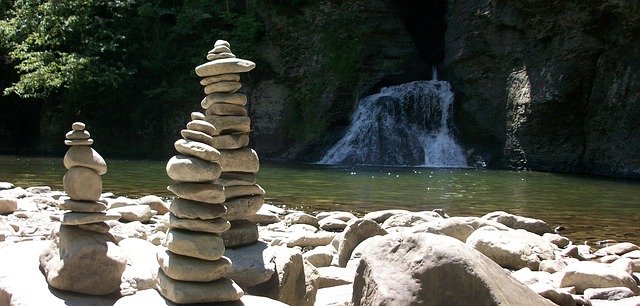 M asks: “Have you ever heard about stacking rocks or stones? This seems to be a recent fad being seen in areas large and small. I'm just wondering how much connection the habit has to New Age beliefs. I have seen small structures being built along our walkway in our neighborhood. I wondered what would be a proper way to respond to their existence, or if I should ignore them.”
M asks: “Have you ever heard about stacking rocks or stones? This seems to be a recent fad being seen in areas large and small. I'm just wondering how much connection the habit has to New Age beliefs. I have seen small structures being built along our walkway in our neighborhood. I wondered what would be a proper way to respond to their existence, or if I should ignore them.”Rock stacking is indeed a new fad among Instagramers who like to impress their followers with posts of themselves and their stacks. What might seem like an innocent photo op is actually quite detrimental to the environment and can also be very much connected to New Age beliefs, particularly to meditation practices.
Stacked stones, known as cairns, are typically been used to mark trails or, in the case of Native Americans, to indicate sacred burial places. However, the Instagram craze has produced a blight of these rock stacks in the world’s natural places that ecologists say are becoming a hazard to the environment.
According to this article, when people rearrange the rocks they find in the environment, they’re tampering with an animal’s home environment. By disturbing that environment just for the sake of a photograph could be putting and animal – or even a whole species – at risk.
"That's what the animals live under and any disturbance to that can mean that the animals are pushed out," ecologist Nick Clemann said.
"Some of the endangered species we work on occur in tiny colonies in little rock outcrops, and a bit of stacking in that area can rapidly mean that colony is no longer viable… [It] destroys the burrow system for those lizards and it can knock those colonies out."
Is a photograph really worth doing this kind of damage to the environment?
But that’s not the only problem with rock stacking. These stacks can be very much linked to New Age beliefs and practices.
For example, in this article, entitled, “The Yoga of Rock Stacking” the use of rock stacks is compared to the practice of yoga: “Much like how yogic texts can deepen our knowledge of yoga, and poses deepen our knowledge of our bodies and inner selves, so stacked stones can tell us more about the environment around us. Or, when stacked by our own hands, be a meditative activity that allows us deep within ourselves. To move through our favorite yoga sequence requires patience, focus, and a deep stillness of the mind—these too are needed for the cautious, meditative practice of balancing stones.”
Robyn Martin, senior lecturer at Northern Arizona university in Flagstaff, calls for an end to the New Age version of the practice in this article because these stacks are becoming such a blot on the landscape.
“First, if they're set in a random place, they can lead an unsuspecting hiker into trouble, away from the trail and into a potentially dangerous place,” Martin writes. “Second, we go to wilderness to remove ourselves from the human saturation of our lives, not to see mementoes from other people's lives.”
In some areas, such as in a popular state park in Sedona, Arizona, a popular New Age hangout, there are hundreds of these stone stacks – known as “prayer stone stacks” that some say are attempts to tap into the 1987 New Age “Harmonious Convergence” - a mystical moment when planets supposedly aligned to amplify "spiritual energy" in the universe but that never happened.
“Where there were just a dozen or so stone stacks at a much-visited state park on Sedona's Oak Creek 10 years ago, now there are hundreds,” Martin writes. “What's more, the cairn craze has mushroomed, invading wilderness areas everywhere in the West.”
Martin is calling for an end to the practice. “Fight the urge to stack rocks and make your mark. Consider deconstructing them when you find them, unless they're marking a critical trail junction. If you must worship in the wild, repress that urge to rearrange the rocks and just say a silent prayer to yourself. Or bring along a journal or sketchpad to recall what you felt in the wild.”
She suggests that people leave their egos at the trailhead and leave earth’s natural beauty alone. After all she says, it’s already perfect as it is.
© All Rights Reserved, Living His Life Abundantly®/Women of Grace® http://www.womenofgrace.com
Women of Grace® has compiled a library of over 1400 articles on New Age and occult related material and has been offering them to the public for more than a decade – at no charge! If you appreciate our research, please prayerfully consider making a donation to support this vital work! Click here to donate!
